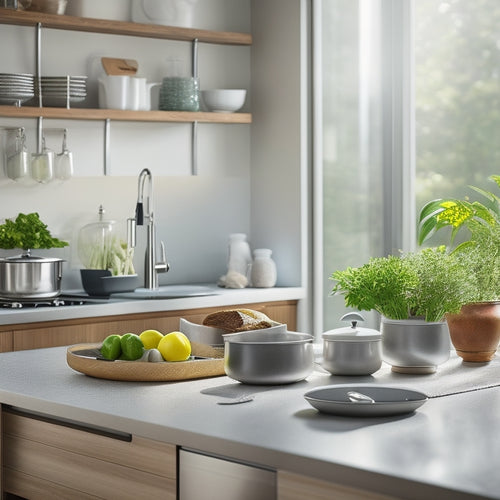
Kitchen Safety: Your Ultimate Checklist
Share
Maintaining a safe kitchen environment is vital for preventing accidents, foodborne illnesses, and meeting regulations. A detailed checklist should encompass compliance and regulations, including ventilation requirements and waste disposal rules. Safety measures and inspections are also critical, such as implementing fire safety protocols and conducting routine ventilation checks. Additionally, acquiring required licenses and certifications, such as food handler's cards, showcases proficiency in food safety. By following this ultimate checklist, kitchen owners and staff can guarantee a safe and healthy environment. To fully comply and ensure safety, it is imperative to review and implement all necessary measures.
Key Takeaways
• Ensure compliance with health regulations to maintain a safe kitchen environment and avoid severe penalties.
• Implement safety precautions and conduct regular inspections to minimize accidents and foodborne illnesses.
• Obtain necessary licenses and certifications, such as food handler's cards, to demonstrate adherence to health and safety regulations.
• Conduct ventilation inspections and ensure proper waste disposal and plumbing to prevent hazardous fumes and disease spread.
• Provide staff training on food safety practices and regularly review and renew licenses to maintain compliance and expertise.
Compliance and Regulations
Compliance with health regulations is an essential aspect of maintaining a safe and healthy environment in residential kitchens. It involves following a set of strict guidelines and standards.
Ventilation requirements are vital in removing hazardous fumes and particles from the kitchen. A thorough inspection process is necessary to verify that ventilation systems meet the required standards.
Waste disposal regulations are also in place to prevent the spread of diseases and maintain a clean environment. Compliance checks are regularly conducted to verify that kitchen operators adhere to these regulations.
Failure to comply can result in severe penalties, including closure of the kitchen. By understanding and adhering to these regulations, kitchen operators can create a safe and healthy environment for food preparation and handling.
Safety Precautions and Inspections
Every residential kitchen is required to implement a range of safety precautions to minimize the risk of accidents, injuries, and foodborne illnesses. Regular inspections are crucial to ensuring these precautions are effective.
Ventilation inspections help identify potential hazards in the kitchen's exhaust system. Fire safety measures, such as fire extinguishers and suppression systems, can prevent devastating consequences.
In addition, waste disposal and plumbing regulations must be adhered to, ensuring that waste is properly disposed of and plumbing systems are functioning correctly. Regular inspections can detect potential issues before they become major problems, thereby safeguarding the health and well-being of kitchen staff and customers alike.
Licenses and Certifications
In addition to implementing safety precautions and undergoing regular inspections, kitchen establishments must also obtain the necessary licenses and certifications to operate legally and guarantee a safe environment for food preparation and service. Obtaining the required licenses and certifications demonstrates adherence to health and safety regulations, ensuring a safe environment for customers and employees.
Here are three essential considerations for licenses and certifications:
-
Training requirements: Make certain that all staff members undergo necessary training on food safety practices and protocols to maintain a safe kitchen environment.
-
Renewal process: Regularly review and renew licenses and certifications to avoid expiration and maintain compliance with regulations.
-
Certification types: Acquire necessary certifications, such as food handler's cards or HACCP certifications, to demonstrate expertise in food safety and handling.
Frequently Asked Questions
What Are the Consequences of Not Meeting Health Department Regulations?
"When the rubber meets the road, non-compliance with health department regulations can lead to severe consequences, including hefty fines and even closures, ultimately putting public health at risk and tarnishing a business's reputation."
Can I Renovate My Kitchen Without a Professional Contractor?
When considering a DIY renovation, it's important to prioritize safety precautions to avoid potential hazards. Make sure you possess the necessary skills, knowledge, and permits to undertake the project, and always follow local building codes and regulations.
How Often Should I Clean and Sanitize My Kitchen Equipment?
To mitigate food poisoning risks, clean and sanitize kitchen equipment daily, focusing on high-touch areas and utensils that come into contact with raw ingredients, to prevent cross contamination and maintain a safe food handling environment.
Are There Any Specific Requirements for Kitchen Flooring Materials?
When selecting kitchen flooring materials, prioritize slip-resistant flooring and durable materials that can withstand heavy foot traffic, spills, and cleaning products, ensuring a safe and efficient working environment.
Can I Prepare and Sell Food From My Home Kitchen Legally?
'Entrepreneurial endeavors clash with culinary caution: Can home kitchens legally prepare and sell food? Yes, but only by following regulations and guidelines for home-based businesses, ensuring legal food sales that meet strict health and safety standards.'
Related Posts
-

Under-Sink Storage Tips for Minimalist Kitchens
To maximize under-sink storage in your minimalist kitchen, start by utilizing vertical space with shelf risers and st...
-

Rustic Hanging Racks for Country-Style Kitchens
Rustic hanging racks are a game changer for your country-style kitchen, blending functionality with charm. They maxim...
-

Dish Drainer Options for Kitchen Islands
When selecting dish drainers for your kitchen island, consider options that maximize space and enhance workflow. Comp...


